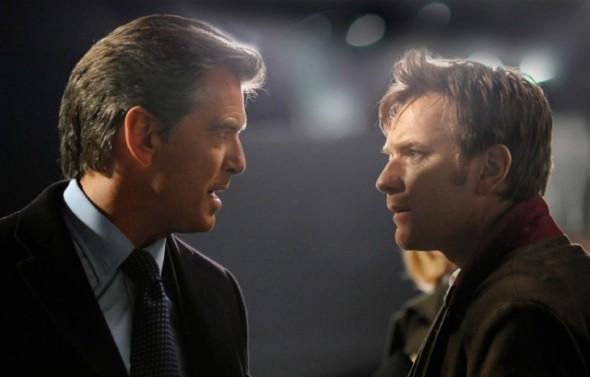Alfred Hitchcock was a master of using music and natural sounds
to ratchet up the suspense of a scene, and Roman Polanski uses the
same dexterity in his newest thriller, “Ghost Writer.” The movie
opens with an innocuous enough vignette—a ferry is coming into the
dock, the bow mechanism shifts to allow the ramp to extend,
reflective-vested guards slide the safety chain back and then start
to signal drivers to begin to exit the vessel.
Simple enough, but the music (played in a minor key with basso
profundo horns), signals that something is amiss, and we quickly
notice what this is. One car isn’t moving. Windows up, with doors
locked, the guards peer through the misted-over glass and see no
one inside. Frustrated, they turn instead to the other cars and
safely guide them around the blockage until only the BMW remains
and a tow truck backs in, extends its cradle, lifts the car’s front
end, and drives away.
Flash to a secluded, wind-swept beach where waves roll an
overcoated body back and forth at the tideline. This body, we soon
learn, is the drowned remains of a very drunk ghost-writer working
on the memoir for the former British Prime Minister Adam Lang
(Pierce Brosnan). Since the publication date is only a month away,
a replacement is needed—a ghost-writer who writes quickly and in
the subject’s voice and yet remains steadfast in being uninvolved
and apolitical—a man audiences only know as The Ghost (Ewan
McGregor).
Although his agent (Jon Benthal) thinks this is a great
opportunity, The Ghost isn’t so sure. When he gets mugged while
leaving the publisher’s London office, he tells his agent to forget
it. “But it’s a quarter-million dollars for a month’s work…” the
agent pleads, and once again, money talks.
The next morning, The Ghost arrives at a security-gated and
patrolled estate on Martha’s Vineyard. Here, in a gray and brown,
glass and granite house constantly buffeted by wind and fog and
rain, Lang, his wife Ruth (Olivia Williams), personal secretary
Amelia (Kim Catrall) and a few other loyal staffers protect and
defend Adam Lang and the precious, single copy of the manuscript.
“You can’t take it out of this room,” Amelia tells The Ghost as she
opens an encrypted file drawer and hands him a thick, rubber-banded
pile of over 600 typed pages. “You should read it now,” she
commands, “I’ll have sandwiches brought up.”
When the cook arrives with the sandwiches, the turgid prose has
worked it’s magic, and The Ghost is asleep at the desk.
The Ghost meets his subject several hours later, but the
interview is cut short. The TV news announces Lang may soon be
indicted for war crimes involving his policy of turning over
suspected terrorists for “rendition” to countries which use torture
to obtain evidence.
The Ghost moves into a nearby hotel, where a well-dressed
British man in the bar asks him if he knows where Andrew Lang is
living. “I haven’t a clue,” The Ghost replies. This stranger proves
to be a clue himself, for when The Ghost goes to his room, the door
is ajar and his papers are scattered on the floor. “Has anyone been
to my room?” he asks the manager, (who dresses like an 18th Century
inn keeper —but one with I-Pod earbuds), and she tells him he is
the only guest.
Using Robert Harris’ taut script Polanski carefully builds the
sense of suspense and paranoia. The Ghost ends up living at the
Lang house with people who fight and bicker inside while militant
protestors set up barricades outside. We learn the personal
secretary is also Lang’s mistress, the former ghost writer had
uncovered a CIA connection to Lang’s meteoric career, and an old
man (Eli Wallach) privately tells The Ghost “I’ve lived here for
over 54 years, and there’s no way the currents could have washed
that man’s body from the ferry to this part of the beach.”
Comments? E-mail
gi*********@co*****.net
.
54.1
F
Healdsburg
November 17, 2024








